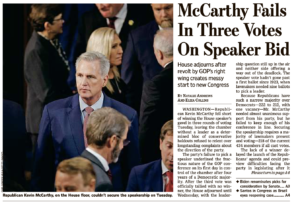The House Agriculture Committee unveiled a draft farm bill Friday that would revamp a key international food aid program, boost risk management options for specialty crop growers and nullify California's…
Farm Bill Backdrop: “Pace of New Legislation is Expected to Slow,” as Divided Government Returns
Wall Street Journal writers Katy Stech Ferek and Natalie Andrews reported in Tuesday’s paper that, “A new era of divided government dawns this week as the 118th Congress begins, with Republicans looking to deploy their power with a fragile majority in the House and Democrats doing the same in the Senate.”
“The opening session is expected to kick off two years of intense political battles over everything from immigration policy to inflation to domestic energy production,” the Journal writers said; adding that: “As a result, the pace of new legislation is expected to slow compared with what advanced under Democratic President Biden’s first two years on issues such as healthcare, climate, infrastructure, veterans’ care and gun control.”
Ferek and Andrews reminded readers that, “Any GOP legislation passed by the House would need to also be approved by the Senate, where Democrats will control 51 seats and most bills require 60 votes to advance. Mr. Biden can also veto legislation he opposes.”
Also in Tuesday’s Journal, Eliza Collins and Aaron Zitner reported that, “Senate Democrats will have a 51-49 seat majority, including independents who caucus with them. In the House, Republicans are set to have a 222-212 advantage, with one vacancy.”
Meanwhile, writing on the front page of Wednesday’s Wall Street Journal, Natalie Andrews and Eliza Collins reported that, “Republican Kevin McCarthy fell short of winning the House speaker’s gavel in three rounds of voting Tuesday, leaving the chamber without a leader as a determined bloc of conservative holdouts refused to relent over longstanding complaints about the direction of the party.”

“The lack of a winner delayed the launch of Republicans’ agenda and could preview difficulties facing the party in legislating as it takes control of the chamber, after winning the midterm elections.
With no speaker in place, lawmakers can’t be sworn in and no other business is allowed.
Andrews and Collins explained that, “The House speaker dictates which bills make it to the floor and is responsible for shepherding must-pass legislation, such as spending bills, that typically need bipartisan support, and negotiating with Senate leaders and the White House. Democrats continue to control the Senate.”
Amy B Wang, Marianna Sotomayor and Jacqueline Alemany reported on the front page of today’s Washington Post that, “Lacking a speaker, the House cannot swear in its members to approve a rules package that would govern how the chamber operates over the next two years.”
In other developments, Matt Viser, Cleve R. Wootson Jr. and Liz Goodwin reported in today’s Washington Post that, “At the precise time that infighting continued to prevent House Republicans from electing a speaker, President Biden and Senate Minority Leader Mitch McConnell appeared together here [Covington, Ky.] Wednesday in a rare joint event, both of them touting the need to showcase competent governance and bipartisan accomplishments.”
“The differing GOP approaches — House leaders unable to get elected by their caucus as Senate leaders tout bipartisan work — reflect a party that stands divided over its direction,” the Post writers noted.
“‘It’s certainly a different business model,’ said Sen. John Thune (R-S.D.), McConnell’s top deputy.”
“To Thune, Wednesday’s visit sent a message that Congress needs to function even in an era of divided government. ‘There’s a lot of things we disagree on, a lot of things we dig in and fight on, but we’re going to have to be trying to find those areas of common ground [so] we can put up some victories and hopefully get some solutions for the American people,’ he said.”
As was pointed out in November, Farm Bill passage may be getting “much harder.”





